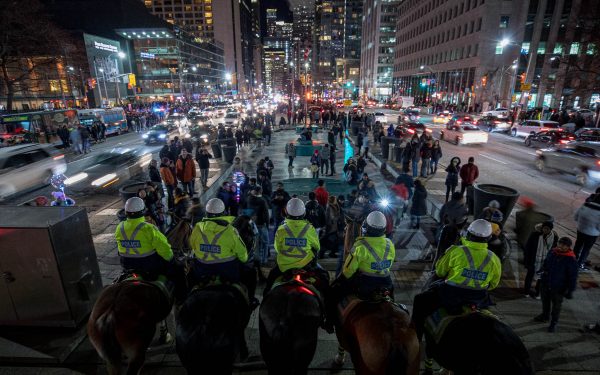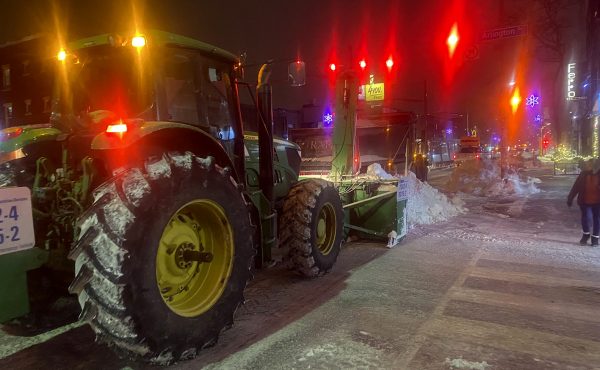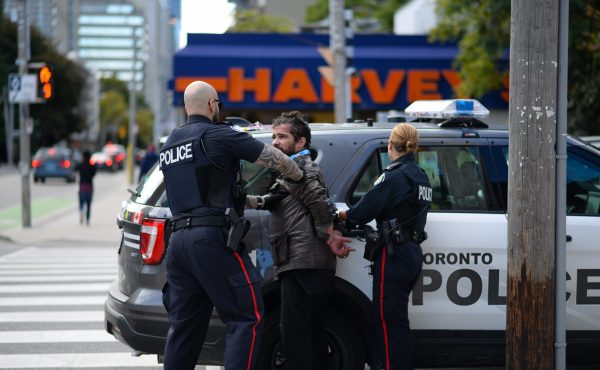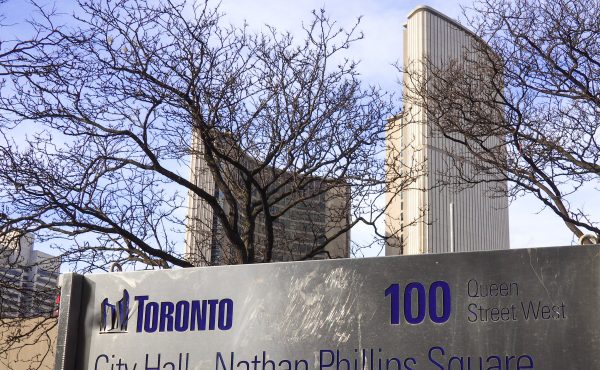
By this point in our unwieldy mayoral by-election, it should be crystal clear that the standard bearer for the inevitable law-and-order campaign is Mark Saunders, a former homicide detective who served as Toronto’s chief of police for five years (2015-2020).
He kicked off his campaign with ominous warnings about “out of control” violence on the TTC, inappropriately re-tweeted Toronto Police Service incident notices to demonstrate the rising mayhem, and has pushed to halt the city’s bike lane program. While Josh Matlow is the left-of-centre candidate most specifically associated with a defund-the-police campaign, Saunders — who enjoys the organizational and political backing of Doug Ford’s government — has attacked Olivia Chow for this same rhetorical sin. “We’re in a public safety crisis,” he says in his social media ads. “I’m the only candidate that [sic] can stop her. Are you with me?”
Much has been said about Saunders’ dismal record as chief — his indifference to the early stages of the Church Street Village serial killer investigation and his tolerance of officers ignoring appalling traffic violations.
In 2014, shortly before he became chief, his predecessor Bill Blair came out strongly in favour of sweeping reforms, recommended by former Supreme Court justice Frank Iacobucci, to the way the Toronto Police Service responds to emotionally distressed individuals in crisis. Saunders mostly ignored those proposals — a direct response to Sammy Yatim’s shooting death by Const. James Forcillo. Council in 2021 finally got around to enacting some of those reforms — e.g., establishing a community crisis response service staffed by psychiatric nurses and social workers instead of cops — but only after Saunders had retired, citing health issues.
What I want to focus on here is the looming crisis of civilian oversight of the police in the event of a Saunders victory on June 26. To my mind, this structural problem should be garnering far more attention than it has received so far.
Some architecture to set the stage: The Toronto Police Services Board (TPSB), the civilian governance body, has seven members: three provincial appointees, three council appointees, and the mayor or their designate. The Toronto Police Service, as most people know, is the single largest line item of the City’s budget, although council has extremely limited ability to manage that billion-dollar-plus outlay for reasons that seem not merely antiquated but deeply blinkered.
The next mayor, in theory, will have access to the provincial government’s newly enacted strong mayor powers, which include the ability to appoint and manage senior city officials, present a budget, make council appointments, and over-ride council decisions with just nine votes on items deemed to be “provincial priorities.” (Deemed by whom, of course, is the $1 billion question.)
The next mayor, in practice, will only have access to that contentious anti-democratic veto if he or she is sufficiently conservative. A Mayor Chow or a Mayor Matlow won’t get to use it, even if they wanted to. A Mayor Saunders for certain will, and there’s much in his campaign rhetoric to suggest that he intends to not only use it, but use it frequently.
The sheer opacity of Ford’s absurd veto is a subject for another day. What’s as important in the context of today’s column, however, is that if Saunders wins, any prospect of independent civilian oversight of the police will have gone up in smoke. That structural independence, which has only occasionally found expression in our police-besotted city, will be nothing but a punch line.
It’s important to acknowledge that Toronto’s police service has long had the ear of local government — a culture that goes back to the late 19th and early 20th centuries, when policing was not just about keeping the peace, but enforcing social and moral order. (The list of examples is long but includes clampdowns on socialist activists in the 1920s, attacks on bathhouses in the 1970s and early 2000s, and the harassment, very recently, of homeless people living in encampments.)
We’ve seen instances of the police union wielding its clout in elections. Chiefs going back decades have been accorded the status of local royalty. And there are plenty of contemporary examples where the TPSB chair, a patronage post that commands an impressive salary, enjoys a cozy relationship with both the police brass and council’s leadership. I’m thinking of figures like Andy Pringle or Norm Gardner, who clearly saw their jobs as enablers as opposed to overseers.
The mayor, moreover, gets to determine the TPSB’s direction. He or she has four out of seven votes, as well as the ability to appoint those council-designated members.
If you take all these factors together, there’s only one conclusion to be had about a Saunders mayoralty, which is that any last vestige of daylight between the civilian oversight body and the service itself will be extinguished.
Think about Saunders’ mobile phone for a moment. Does it contain the cell numbers of dozens if not hundreds of TPS officers? Of course. Will it contain said contact information after he’s sworn in as mayor? Hard to imagine that it won’t. My point is that he has the means to reach directly into the senior ranks of the service in a way that even the most cop-friendly mayors couldn’t. And visa versa.
Will he avail himself? It’s a question well worth asking, although I doubt we’ll ever get a response with so much as a smudge of candor. For the police, the Ford government and the conservatives on council, those intimate connections are a feature, not a bug.
The reality is that Saunders, as mayor, will have access to, and be accessible by, the senior ranks of the service on any number of occasions: in the run-up to budget season, during high-profile crime investigations, and at those moments when something flares in police-civilian relations.
Can he ask for information on the QT about, well, whatever?
Of course he can. Will he? You be the judge.
My own general view is that police chiefs, because they are by far the most visible civil servants in our society, should simply not be allowed to seek high public office. Admittedly, this argument, viz access to democratic institutions, is weak, although I’d note that we tolerate comparable policies, such as a mandated cooling off periods for former elected officials as well as outright bans on the democratic participation of newcomers and permanent residents, whose taxes municipalities gladly collect but whose participation is expressly excluded.
That said, the trend towards police officers seeking and then winning high-profile political positions — Eric Adams, New York’s mayor, or, closer to home, Julian Fantino and Bill Blair as cabinet ministers — seems like a huge and troubling step backwards, or, more precisely, a big step towards authoritarian governance.
There are so many reasons why Saunders shouldn’t get this job, but for me the most important one has to do with the accountability window that will slam shut if he does. Civilian oversight of law enforcement is already in crisis in Canada, as University of Toronto law professor Kent Roach explained in a recent interview with Spacing.
A Saunders victory, to my eye, will put that critical governance institution on life support.





2 comments
“…police-civilian relations.”
Toronto police are not military police. They are civilians.
Someone might want to remind them of that.